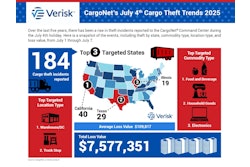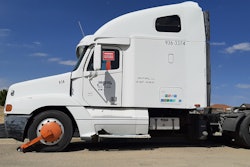The Federal Motor Carrier Safety Administration on Tuesday published responses to comments it received during a 2023 comment period on the proposed development and implementation of a federal appeals process for Requests for Data Review (RDRs) submitted to the agency through its DataQs system.
Additionally, as reported in part Friday, June 27, with the Department of Transportation's announcement of a raft of actions in the trucking regulatory sphere, the agency is pivoting from that federal appeals system to focus on the DataQs requirements for Motor Carrier Safety Assistance Program (MCSAP) Grant funding.
The move comes in response to the comments filed, FMCSA said, many recommending a more impartial review process than is currently the practice in states. The agency “is proposing an approach to improve the fundamental fairness" of the DataQs system by "implementing sufficient process guardrails for States."
If prior survey results are any indication, fundamental DataQs improvement for timeliness and impartiality will be welcomed by many in trucking. Overdrive readers earmarked DataQs process issues among several areas it hoped the Trump administration and its DOGE effort could impact. At once, delayed removal of violations associated with court-adjudicated citations through DataQs may remain a problem, given local courts' role in contesting tickets.

As owner-operator Adam Mackey noted as part of prior reporting, "Fighting tickets is now almost impossible" within the system. "Instead of having my day in court, I have to submit multiple letters and get denied multiple times until six to eight months later I finally might get my day in court. Lawyers don't understand it, and drivers don't have the time or money to jump through all the hoops."
Nonetheless, the agency hoped the new changes it's proposing will at least "benefit users by ensuring appeals are reviewed in an independent, impartial, uniform, and transparent manner, as well as providing timelines for the initial request and appeals process.”
The agency is now accepting comments on that proposal for 60 days.
The agency's previous idea first saw light in 2023
FMCSA's 2023 notice proposed an appeal process for third-stage DataQs reviews -- or requests for change to a violation, crash or other information that have been rejected at least twice already, whether by state or federal officials, with some limitations.
[Related: FMCSA proposes federal system for third-stage DataQs appeals]
Currently, states are responsible for reviewing and resolving all "requests for data review" (RDRs) within the DataQs system that pertain to the safety data collected and reported in the Motor Carrier Management Information System (MCMIS) by the state. The current system allows carriers to use the DataQs system to request an RDR within the FMCSA system and, if applicable, provide supporting documentation.
Depending on the nature of the request, the review is routed to the appropriate DataQs program office. That office can vary considerably -- it can be a state agency, an FMCSA field office, or FMCSA headquarters -- yet most DataQs reviews are assigned to the appropriate state agency for review, since states are most often uploading carrier data to MCMIS.
After a decision is made on the initial review, that decision can be appealed -- known as an "RDR Reconsideration" -- which could be routed to the same program office as the initial review or follow a different process in some instances, FMCSA noted, depending on the review type. (Some states, like Minnesota, put such reconsiderations/appeals to a dedicated review team with at least some industry representation.)
[Related: Nonpreventable-crash DataQs of utmost importance for small fleets, owner-ops]
In its 2023 notice, FMCSA proposed that DataQs users would be able to initiate a request for an FMCSA appeal, but only after both the initial review and the RDR Reconsideration reviews have been denied. The agency collected 54 comments in response to that notice, 42 of which were specific to the changes proposed, FMCSA said. The “majority of the comments were balanced in tone and supportive of FMCSA’s proposal to develop and implement a federal appeals process for RDRs.”
Many comments “provided suggestions on improving the proposed appeals process and DataQs program more broadly,” the agency added. In its responses published July 1, FMCSA split the comments into three categories:
- Calls to improve the impartiality of the RDR process
- Suggested approaches for the federal appeals process and the DataQs program
- Requests to enhance the timeliness of RDRs
[Related: Preventable or not? When to use DataQs to request crash reviews for preventability]
Challenge-process impartiality
Thirty commenters asked that FMCSA improve impartiality in processing RDRs. Of those, 13 commenters -- including the National Association of Small Trucking Companies, Owner-Operator Independent Drivers Association, Trucker Nation and others -- took issue with RDRs being reviewed by the officer, inspector, or agency that performed the inspection or issued the violation.
The National Tank Truck Carriers (NTTC) group pointed out that “there are many times that an inspector refuses to make a correction despite evidence that they made a mistake,” FMCSA noted, while NASTC and Trucker Nation offered recommendations to improve impartiality. NASTC suggested FMCSA require states to “establish adjudication by independent third parties and to disallow involvement in adjudication by any state or local body or other party with [an] actual or appearance of conflict of interest, such as review by the issuing officer or his or her supervisor.”
Trucker Nation added that the “issuing officer [should] serve only as an information source for the analyst/adjudicator who is assigned to the RDR” to enhance the objectivity of the RDR process.
Regarding requests asking that the RDR be reviewed again after the initial decision, several commenters recommended FMCSA’s proposed state guidelines include a requirement that such "RDR Reconsiderations" be addressed by a reviewer different from the initial reviewer.
Several voices called for a standard, nationwide process for RDRs. Some commenters also claimed to have their DataQs reviews closed without explanation, “which led to assumptions of bias in the review process,” FMCSA said.
FMCSA’s response
After analyzing comments, as noted at the top, FMCSA determined that “its initial proposal for a federal-level appeals process would not sufficiently address the due process issues that currently exist with State-reviewed RDRs.”
Instead, the agency now proposed to improve fairness with new state requirements, including changes to the MCSAP Grant requirements that “would provide necessary guardrails for the RDR process, accountability for States, and empower States to take more complete ownership of their DataQs programs.”
[Related: How to challenge erroneous violation and crash data: FMCSA's DataQs system]
Eligible RDRs, other process recommendations
Ten commenters called for FMCSA to expand the scope of RDRs eligible for the federal appeals process. The Commercial Vehicle Safety Alliance said “it is [not] practical to go through the effort that will be involved in establishing and maintaining this federal appeals process if it will not address the majority of the RDRs that would be submitted.” Other commenters offered specifics on what specifically should be eligible, and Trucker Nation suggested that all violation types should be eligible.
The American Trucking Associations supported a more limited scope for the federal appeals process that was proposed in the 2023 notice, noting that “members raised concerns that allowing all RDRs could create a myriad of submissions that lead to an ineffective independent review process.”
The agency acknowledged that the proposed appeals process “was narrow in scope by only reviewing requests pertaining to interpretation of regulations and policies, leaving many RDRs to be reviewed under processes that exist today.” FMCSA is now proposing “defined processes at each stage of review that will apply to all RDRs submitted for State-collected data in DataQs.”
Six commenters recommended using review panels in the federal appeals process and suggested criteria for those panels. FMCSA agreed and proposed for its MCSAP Grant requirements that states use a panel of subject matter experts in the decision-making process for RDR Reconsideration and final review requests.
Four commenters said FMCSA should share federal appeals decisions publicly, and four also recommended that FMCSA remove all data related to an active RDR from public websites until an outcome is decided. The agency noted that because the new proposal is state-centered and doesn’t include centralized federal review, decisions from RDRs would not be posted publicly on FMCSA’s website, but would be available to the parties involved with the RDR.
FMCSA didn't agree with the suggestion to remove all data related to pending RDRs from public view. “Removing this data creates opportunities for requestors to ‘improve’ their safety records in the short term by submitting frivolous RDRs, which would impact the efficacy of the DataQs program and other FMCSA safety programs,” FMCSA said.
[Related: DataQs reform: A 10% violation error rate should not be acceptable]
Timeliness of the DataQs process
Ten stakeholders voiced concerns around timeliness of current DataQs processes. Establishing deadlines generally would improve the effectiveness of the RDR process, some said, and others suggested specific timelines. OOIDA recommended all RDRs be decided within 60 days of the initial request, the initial review and RDR Reconsideration be completed within 30 days, and the federal appeal review then in consideration within 30 days.
ATA recommended FMCSA provide “an outline of the expected review-time once the RDR is received at the federal level, the steps the agency is taking to address the backlog of current RDRs, and how the program implementation will be handled.”
FMCSA agreed that timeliness is important. Proposed DataQs requirements for MCSAP funding include timeline standards for each stage of review. Proposed standards would require states to "open, review, and communicate a decision within 21 days of the requestor’s submission of an RDR and RDR Reconsideration requests, and within 30 days of the requestor’s submission for Final Review requests,” the agency said.
[Related: DataQs: Are truckers mere 'victims' of the inspection, crash review process?]
FMCSA’s proposal for MCSAP Grant funding
The agency's new proposal here would revise DataQs requirements for MCSAP funding states receive to “ensure proper due process for users of the DataQs system," FMCSA said. "These requirements aim to improve the impartiality, timeliness, transparency, and fundamental fairness of the RDR process, thereby strengthening FMCSA's ability to make data-driven decisions that inform resource allocation, policy changes, and new initiatives to prevent large truck and motorcoach-involved crashes and enhance safety on the nation's roads.”
The agency noted that the requirements would only apply to DataQs requests on state-owned data and would not apply to federally-owned data, such as requests submitted to the Crash Preventability Determination Program, petitions submitted to the Drug and Alcohol Clearinghouse Program, or other FMCSA offices.
FMCSA's proposal would require states to incorporate a multi-level review process for RDRs, escalating the review from the DataQs analyst in the state’s MCSAP Lead Agency to a responsible decision-maker or panel of subject matter experts. Each RDR would be evaluated based on the documentation and evidence provided by the submitter of the RDR, along with any state documents or evidence.
“States would be encouraged to adopt a multi-level review process appropriate for their agency(s) structure to support independent evaluation of the request,” the agency said. “This multi-level review process would benefit the ability for requestors to get a fair and thorough response with assessment from multiple evaluators within a state.”
States would also be required to submit a DataQs Implementation Plan to FMCSA that details how their agency will meet the requirements for each stage of the RDR review process.
The proposed requirements for states’ RDR review process can be seen in the Federal Register docket here.
FMCSA is accepting comments on the proposed requirements for states, including to specific questions mostly directed at states, through Sept. 2. Comments can be filed here.
The agency said following the comment period, a follow-up Federal Register notice will respond to any comments received and announce the revised MCSAP Grant requirements “with ample time prior to implementation.”
[Related: The power of video evidence in fighting tickets, DataQs challenges]










